How to Transform PDFs and Articles into Hands-On Practice Problems
Reading PDFs and articles is passive learning—you might understand the material while reading, but how much can you actually apply? True mastery comes from practice, not just reading.
What if you could automatically generate hands-on practice problems from any PDF or article in seconds? Here's how to transform passive reading into active, practical learning.
The Problem with Passive Reading
When you only read PDFs and articles:
- No retention testing - You think you understand, but can't apply it
- False confidence - Feeling like you know more than you do
- No practical skills - Can't use the knowledge in real situations
- Boring and passive - Mind wanders, low engagement
- Forgetting quickly - Without practice, memory fades fast
Result: Hours of reading with minimal lasting knowledge.
The Power of Practice-Based Learning
Research proves that practice problems:
- Increase retention by 200%+ - Active recall strengthens memory
- Build real skills - Application beats memorization
- Reveal knowledge gaps - Shows exactly what you don't understand
- Engage your mind - Active thinking prevents mental drift
- Transfer to real-world - Practice makes practical
How to Generate Practice Problems from Any Content
Step 1: Find Your Learning Material
Identify PDFs or articles you want to learn from:
- Academic papers
- Textbook chapters
- Tutorial articles
- Technical documentation
- Business reports
- Training manuals
Step 2: Access the Practice Generator
Navigate to https://www.miskies.app/miskies and click "Create New Miskie".
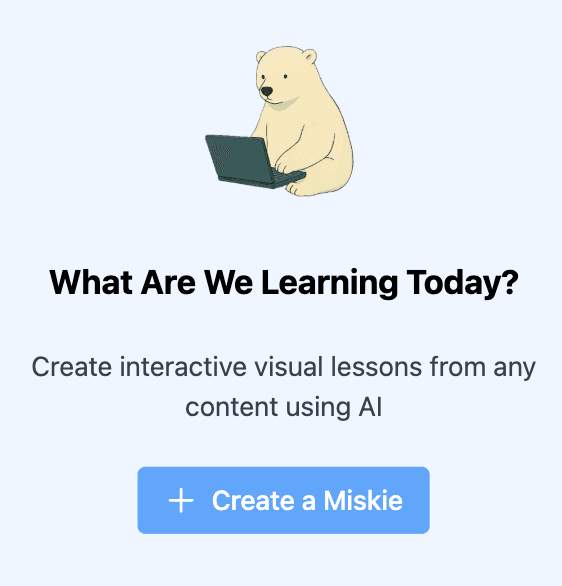
Step 3: Configure Your Practice Session
Set up your hands-on learning experience:
- Name: "Python Functions Practice" or "Marketing Strategy Exercises"
- Learning goal: "Practice implementing functions" or "Apply marketing frameworks"
- Time budget: How long you want to practice
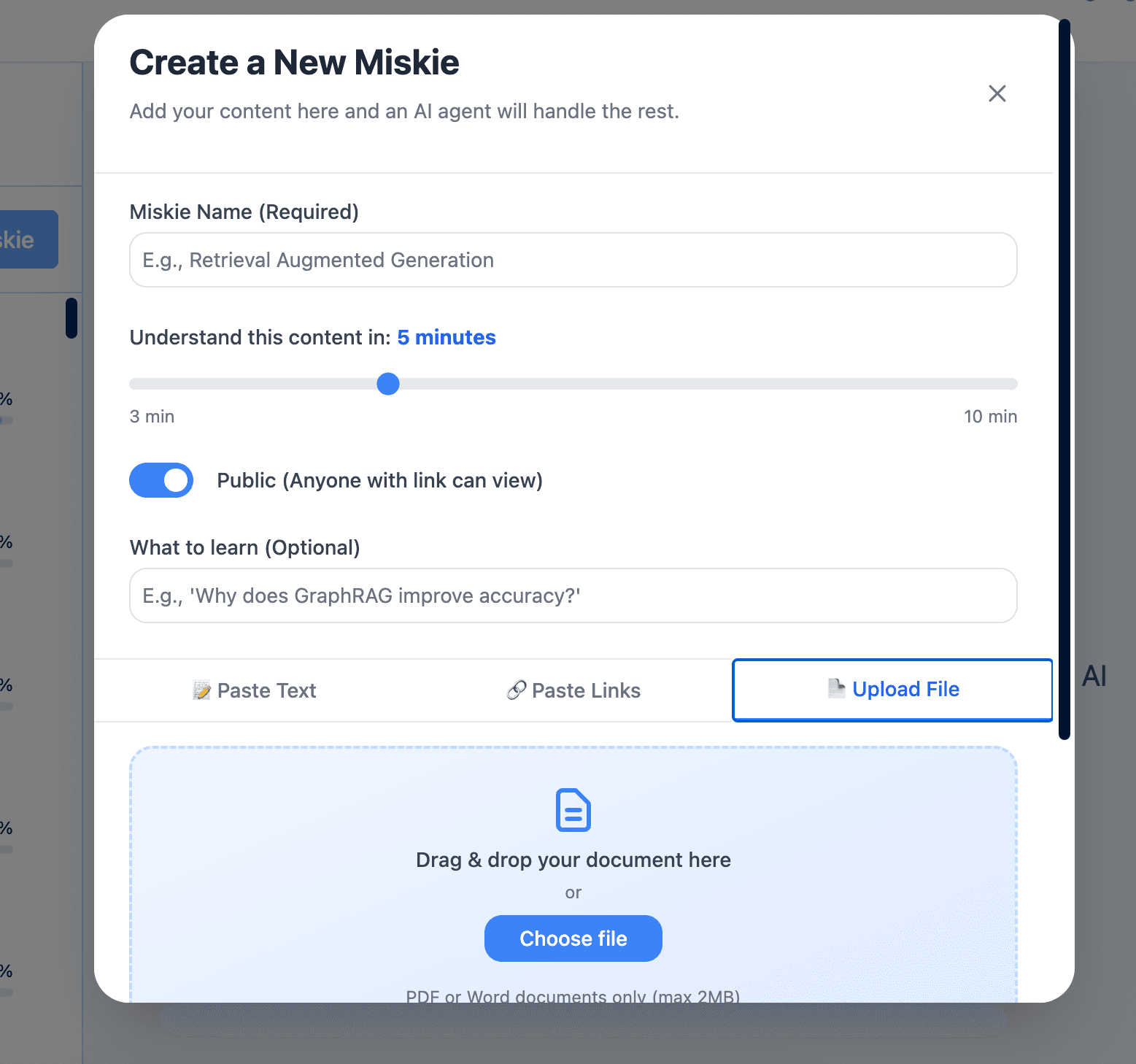
Step 4: Upload Your Materials
Add your content:
- Upload PDF files - Papers, textbooks, reports
- Paste article text - Online tutorials, blog posts
- Share article links - Web-based learning content
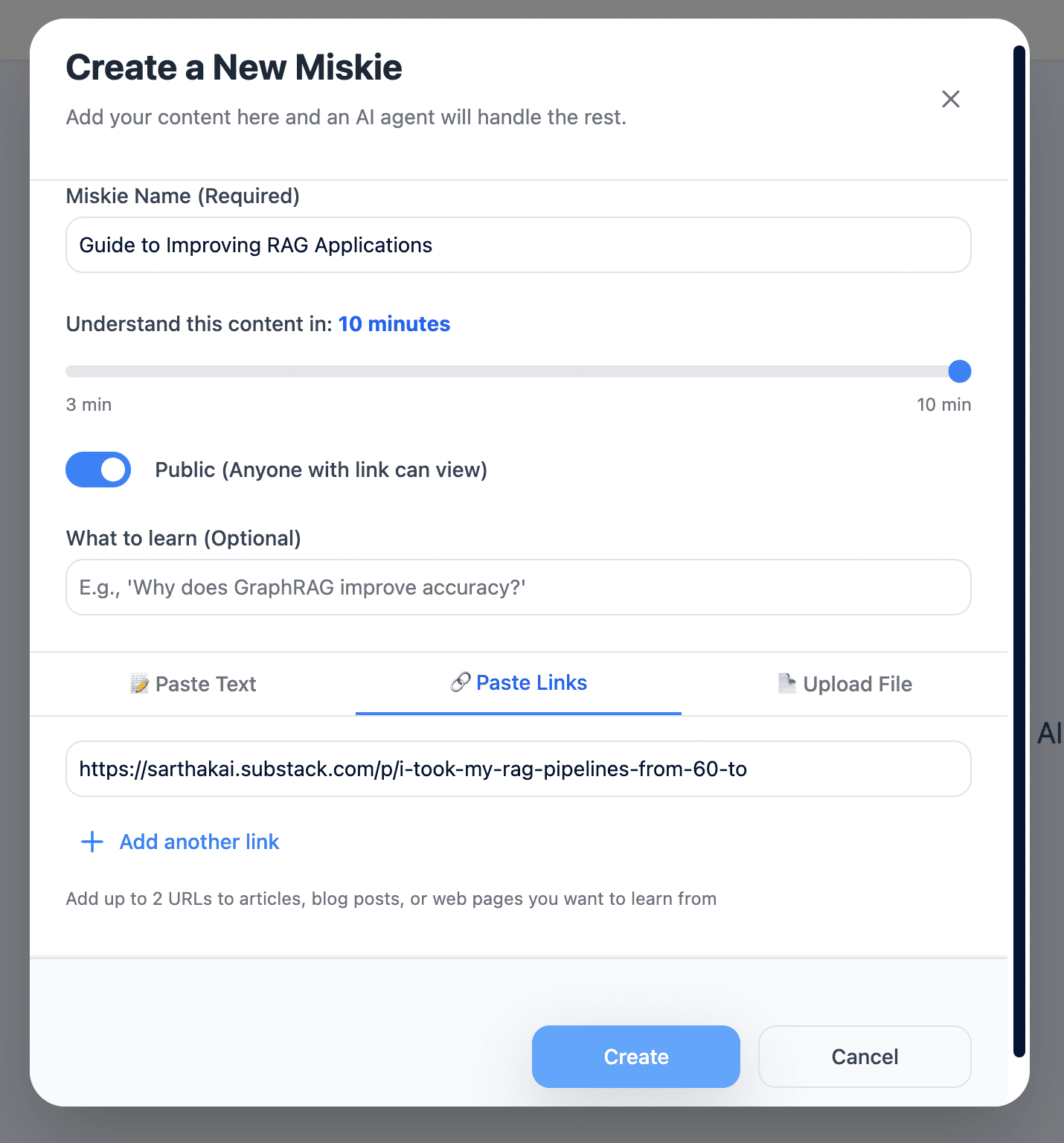
Step 5: Receive Practice Problems
In approximately 30 seconds, AI analyzes your content and generates:
Hands-On Exercises based on the material:
- Real-world application scenarios
- Step-by-step problem-solving tasks
- Practical implementation challenges
- Case study applications
Interactive Activities for engagement:
- Fill-in-the-blank code/formulas
- Matching concepts to applications
- Sorting and categorization tasks
- Decision-making scenarios
Knowledge Checks to test understanding:
- Multiple choice questions
- True/false assessments
- Short answer prompts
- Concept application quizzes
Visual Practice Aids:
- Diagrams showing problem context
- Flowcharts for solution approaches
- Sequence diagrams for processes
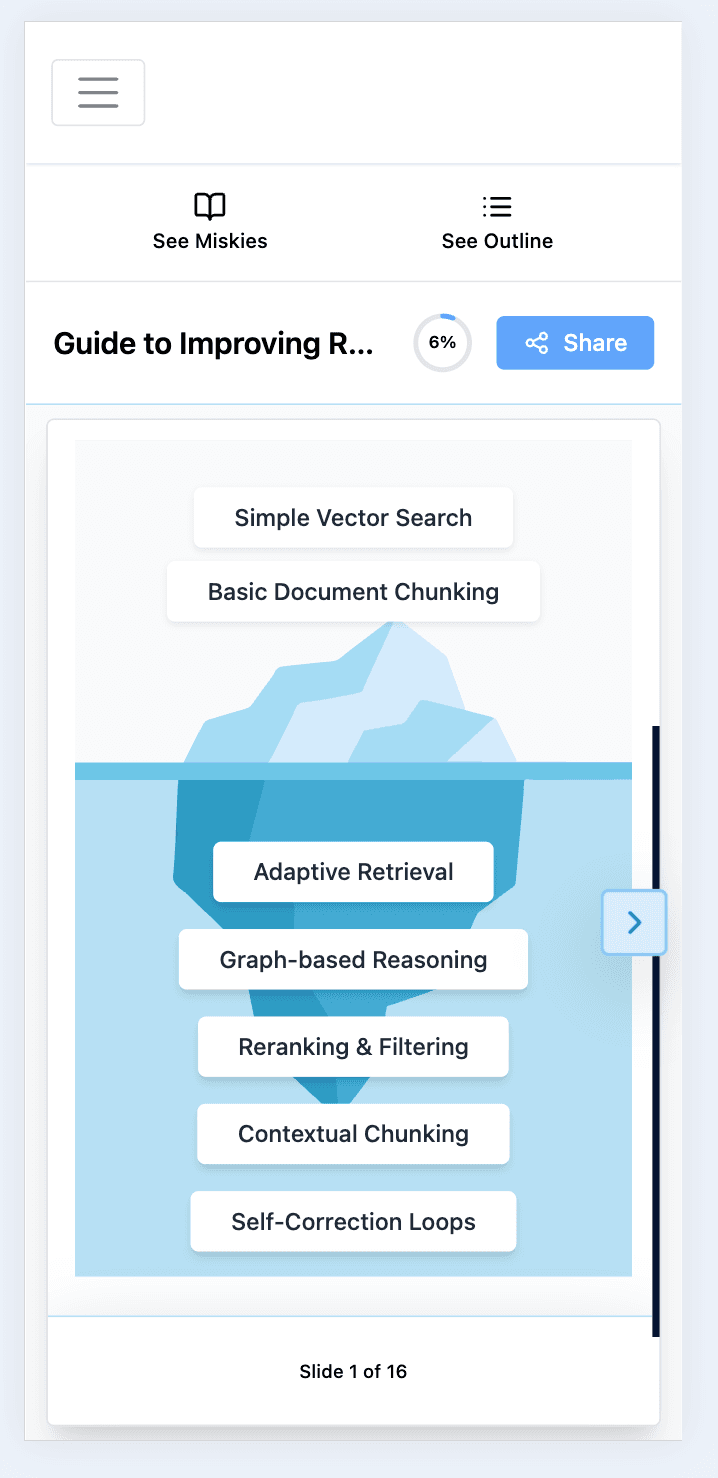
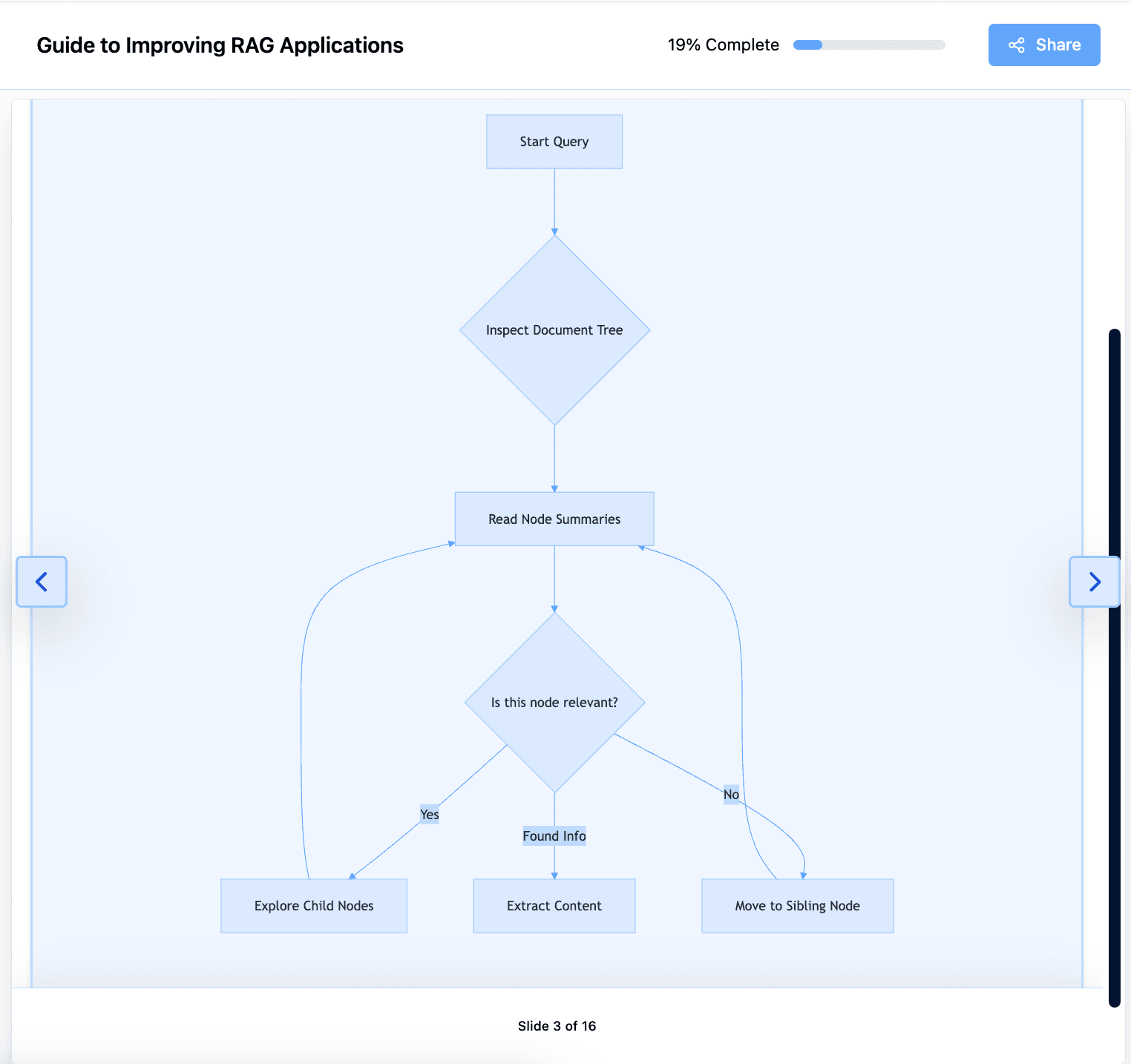
Types of Practice Problems Generated
For Technical Content
Programming Articles → Coding Exercises:
- "Implement this function with the following requirements..."
- "Debug this code based on the concepts covered..."
- "Refactor this solution using best practices from the article..."
Mathematics PDFs → Problem Sets:
- "Apply this theorem to solve..."
- "Prove this relationship using the method described..."
- "Calculate X using the formula covered..."
Science Papers → Experimental Scenarios:
- "Design an experiment to test..."
- "Analyze this data using the methodology..."
- "Predict outcomes based on the principles..."
For Business Content
Strategy Articles → Case Studies:
- "Apply this framework to Company X's situation..."
- "Develop a strategy using the tools described..."
- "Analyze this market using the methods covered..."
Marketing PDFs → Campaign Exercises:
- "Create a marketing plan using these principles..."
- "Segment this audience based on the frameworks..."
- "Design messaging that applies these concepts..."
Finance Reports → Analysis Tasks:
- "Calculate ROI using the formula provided..."
- "Evaluate this investment opportunity..."
- "Build a financial model based on the principles..."
For Academic Content
History Articles → Analysis Prompts:
- "Compare these events using the framework discussed..."
- "Analyze causes and effects based on the reading..."
- "Argue for/against this interpretation..."
Literature PDFs → Critical Thinking Tasks:
- "Analyze this passage using the theory covered..."
- "Compare themes across the texts discussed..."
- "Apply this literary lens to a new text..."
Philosophy Papers → Argument Exercises:
- "Construct an argument using this logical structure..."
- "Identify fallacies in this reasoning..."
- "Apply this ethical framework to a scenario..."
Real-World Transformation Examples
Example 1: Programming Tutorial Article
Original Article Content: "Python decorators are functions that modify other functions. They allow you to wrap another function to extend its behavior..."
Generated Practice Problems:
- Coding Exercise: "Write a decorator that logs execution time of any function"
- Debugging Task: "Fix this broken decorator implementation"
- Application Scenario: "Create a decorator for user authentication in a web app"
- Multiple Choice: "Which syntax correctly applies a decorator?"
Example 2: Business Strategy PDF
Original PDF Content: "Porter's Five Forces framework analyzes competitive forces: supplier power, buyer power, competitive rivalry, threat of substitution, and threat of new entry..."
Generated Practice Problems:
- Case Analysis: "Analyze Uber's competitive position using Five Forces"
- Strategic Planning: "Recommend strategies to improve Startup X's position"
- Force Identification: "Identify the strongest force affecting Industry Y"
- Scenario Response: "How would Force A changing impact Company Z?"
Example 3: Chemistry Research Paper
Original Paper Content: "The reaction mechanism involves nucleophilic attack on the carbonyl carbon, followed by proton transfer and elimination..."
Generated Practice Problems:
- Mechanism Drawing: "Draw the complete mechanism for this related reaction"
- Prediction Task: "Predict products when conditions are modified"
- Analysis Exercise: "Explain why this reaction follows this pathway"
- Comparison: "Compare this mechanism to the SN2 mechanism"
Strategies for Effective Practice
The Immediate Practice Method
- Read section of PDF/article
- Immediately do generated practice problem
- Check understanding before continuing
- Repeat for each section
Best for: Complex technical content requiring step-by-step mastery
The Complete-Then-Practice Method
- Read entire PDF/article first
- Then work through all practice problems
- Review content where you struggle
- Retry difficult problems
Best for: Conceptual content that builds throughout
The Spaced Practice Method
- Generate practice problems immediately
- Do first practice session today
- Repeat problems after 1 day
- Repeat again after 3 days, then 7 days
Best for: Long-term retention and mastery
The Progressive Difficulty Method
- Start with basic comprehension questions
- Move to application exercises
- Progress to advanced scenarios
- End with creative implementation tasks
Best for: Building from foundation to expertise
Benefits of Practice-Based Learning
Compared to Reading Only:
Just Reading PDFs:
- ❌ 20-30% retention after one week
- ❌ Difficulty applying concepts
- ❌ False sense of understanding
- ❌ Boring and passive
Reading + Practice Problems:
- ✅ 70-80% retention after one week
- ✅ Ability to apply in real scenarios
- ✅ Clear view of knowledge gaps
- ✅ Engaging and active
Save Your Practice Problems
Build a practice library:
- Organize by subject or skill - Keep programming, business, science separate
- Track your progress - Mark which problems you've mastered
- Revisit regularly - Practice problems perfect for review sessions
- Share with study groups - Collaborate on challenging exercises
Collaborative Practice Learning
Make practice social:
Share practice problem sets:
- Generate public links for study groups
- Post to class forums or social media
- Help classmates learn actively
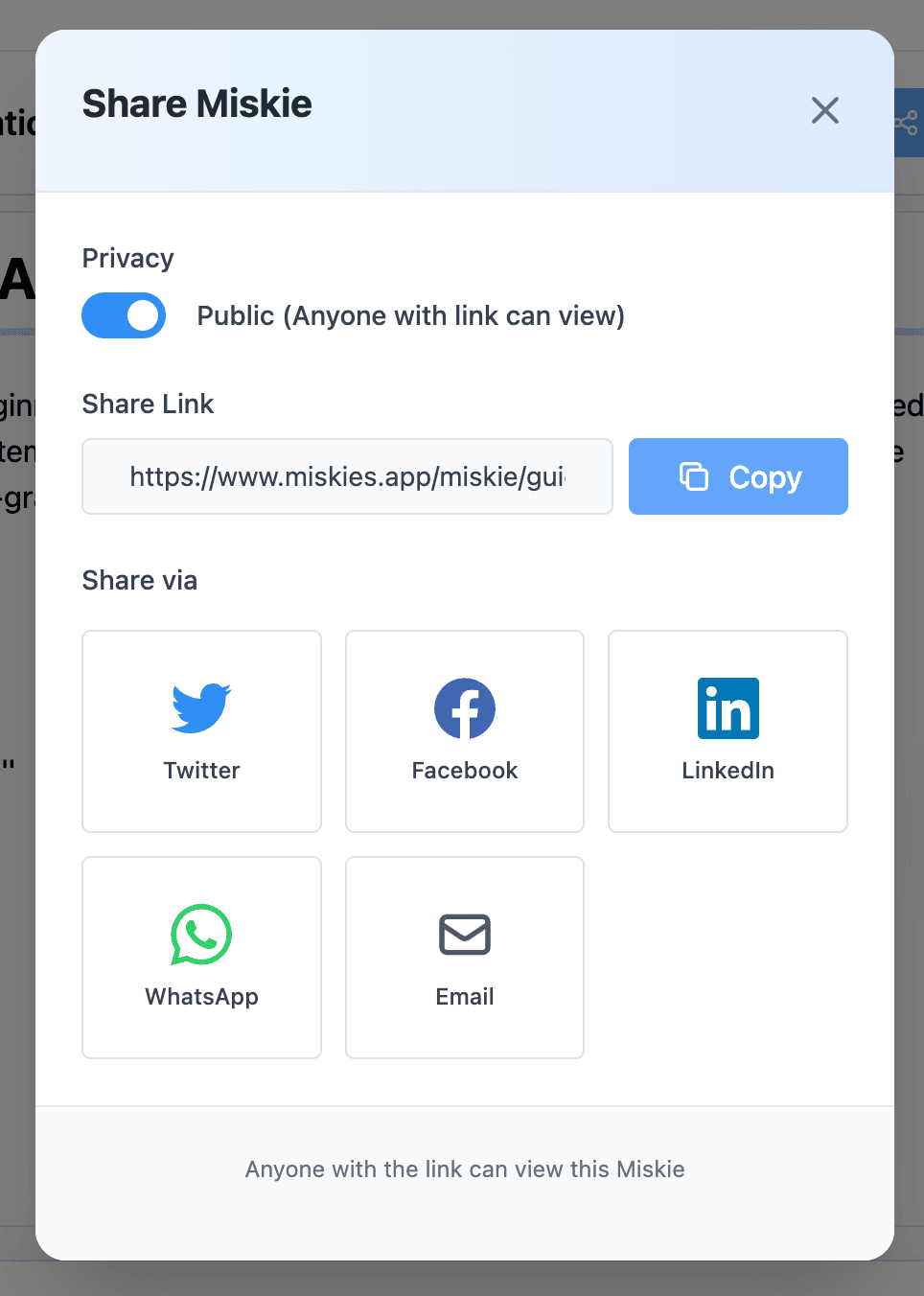
Discover practice problems others created: Browse at https://www.miskies.app/miskies/explore
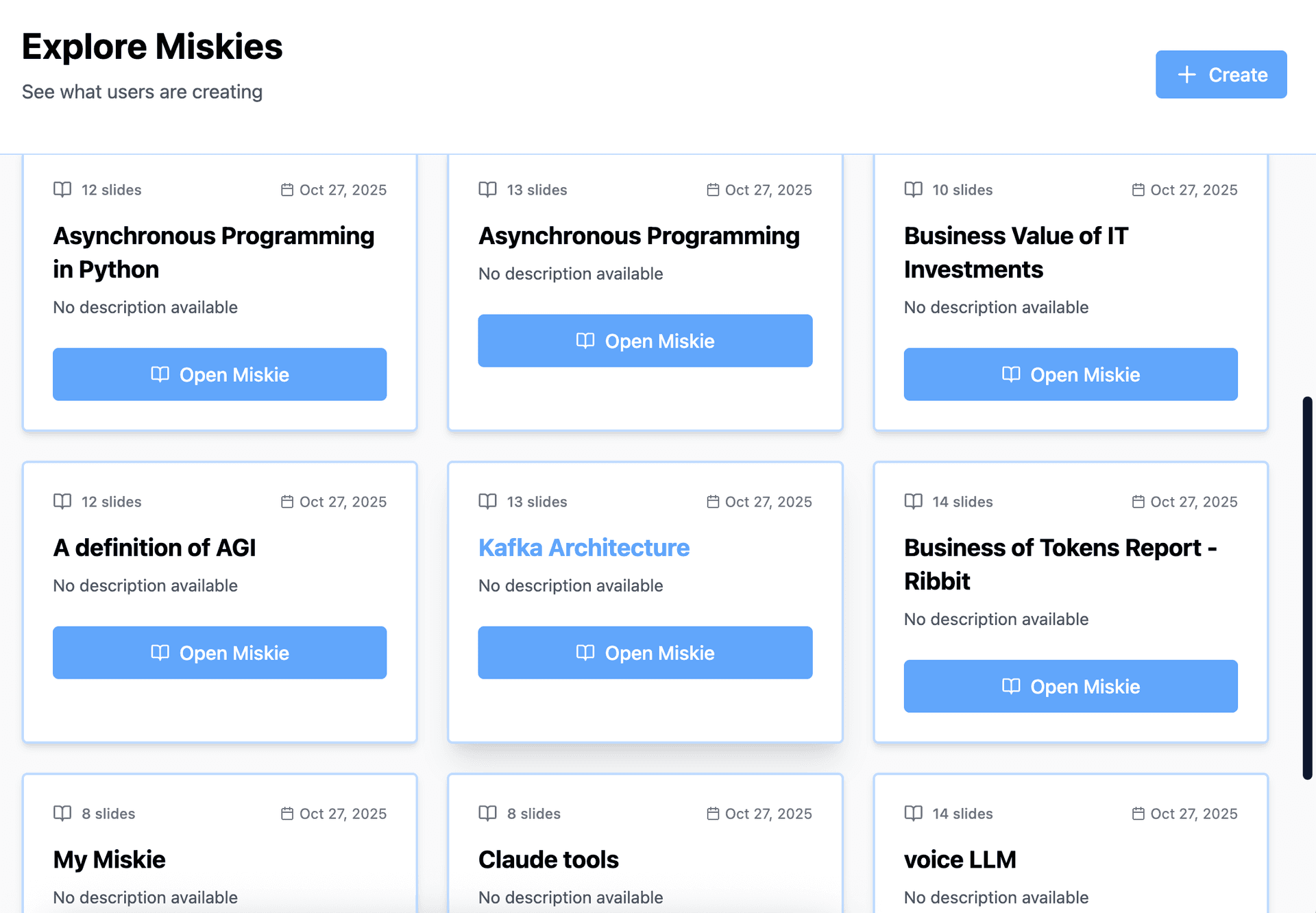
Benefits of collaboration:
- Compare solution approaches
- Learn from others' practice problems
- Build study group activities
- Motivate each other through practice
Tips for Maximum Learning
1. Don't Skip Difficult Problems
Struggling is where learning happens. If you can't solve a problem:
- Review the relevant section of the PDF
- Check the visual diagrams provided
- Try a different approach
- Ask for help if needed
2. Practice Without Looking at Answers
Real mastery means solving independently:
- Close the PDF/article
- Solve from memory
- Check answers afterward
- Identify what you need to review
3. Apply to Novel Situations
The best practice extends beyond the material:
- Try problems with different variables
- Apply to your own projects or interests
- Create your own practice scenarios
- Teach concepts to others
4. Track Your Progress
Monitor improvement over time:
- Note which types of problems are easiest
- Identify persistent knowledge gaps
- See how speed increases with practice
- Celebrate mastery milestones
5. Make It Regular
Consistent practice beats cramming:
- 15 minutes of practice daily > 2 hours once weekly
- Schedule regular practice sessions
- Make it a habit, not a chore
- Build skills progressively
Common Practice Mistakes to Avoid
❌ Only doing easy problems ✅ Challenge yourself with difficult exercises
❌ Looking at solutions too quickly ✅ Struggle for a bit before checking answers
❌ Practicing only once ✅ Return to problems multiple times for retention
❌ Skipping the application scenarios ✅ Real-world application builds practical skills
❌ Not reviewing mistakes ✅ Mistakes are the best learning opportunities
Who Benefits from Practice Problem Generation?
Students
- Convert study materials into exam practice
- Build problem-solving skills
- Prepare for tests actively
- Identify weak areas early
Professionals
- Apply business concepts to real scenarios
- Practice new technical skills
- Prepare for certifications
- Develop practical expertise
Self-Learners
- Transform online articles into active learning
- Build portfolio-ready skills
- Practice real-world applications
- Verify understanding through doing
Teachers & Trainers
- Generate practice materials quickly
- Create diverse problem sets
- Assess student understanding
- Save curriculum development time
Start Practicing Today
Stop passively reading PDFs and articles. Start actively practicing with automatically generated hands-on problems.
Visit Miskies AI and transform your first document into practice problems in 30 seconds.
100% Free • Unlimited Practice Problems • Any PDF or Article
Remember: Reading gives you knowledge, but practice gives you skills.
Keywords: practice problems from PDFs, generate exercises from articles, hands-on learning, active learning exercises, PDF to practice problems, article to exercises, learning by doing, practice problem generator, interactive learning, skill-building exercises